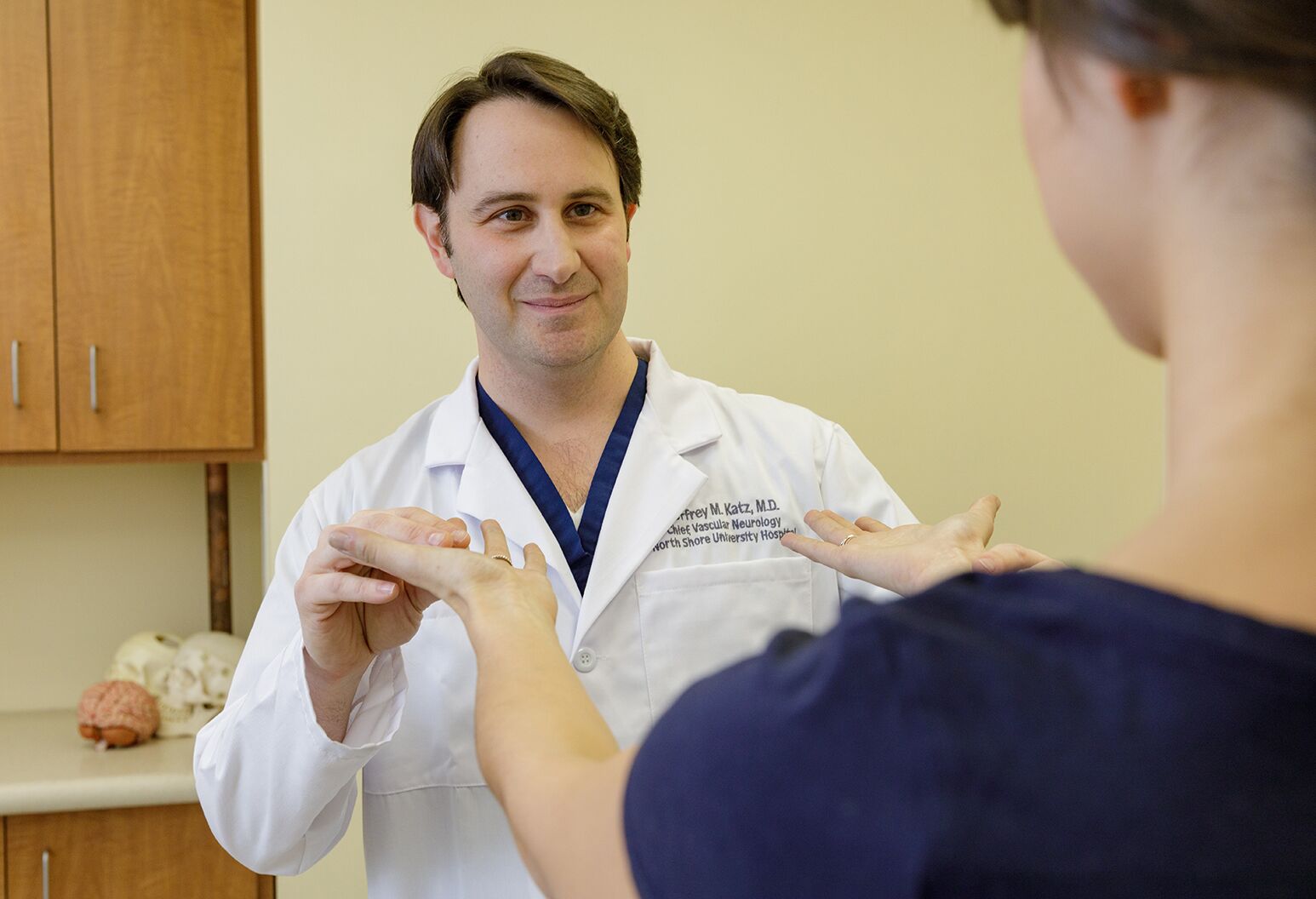Stroke management
What is stroke management?
After you’ve suffered a stroke, you may need to change, relearn or redefine how you live. Following stroke, you may have difficulties functioning physically (e.g., unsteady gait, weakness or paralysis), cognitively (e.g., memory, language or perceptual problems) or emotionally (e.g., anxiety and depression). Effective management techniques can help.
Your medical team may recommend a management strategy that consists of a combination of medical therapy, surgical care and preventive treatment, depending on your specific needs. Stroke management medical therapies include tissue plasminogen activator (tPA), an FDA-approved, clot-busting drug. Surgical treatments include carotid endarterectomy, Solitaire ™ flow restoration (FR) and endovascular stroke treatment. To minimize the chance of a future stroke, you may also be prescribed an antiplatelet agent. Stroke rehabilitation is also an important part of your recovery following a stroke.
Our approach
We are committed to delivering the highest quality care to stroke patients. The Stroke Center at the Northwell Health Institute for Neurology and Neurosurgery offers comprehensive, specialized and cutting-edge treatments for every type of stroke. We employ world-renowned medical and surgical stroke neurologists, neurosurgeons and neuro-interventionalists. The center also brings together other specialists, such as:
- Critical care specialists
- Emergency medicine doctors
- Neuroradiologists
- Nurses and nurse practitioners
- Physician assistants
- Occupational therapists
- Physical therapists
- Speech therapists
We train all stroke team members and educate emergency medical technicians to quickly recognize when someone is having a stroke so they can receive the medical attention they need as quickly as possible. Patients who come in through our emergency rooms are quickly examined and given priority in all testing and diagnosis. Within minutes of a stroke code, our team performs a full patient assessment, rushes the patient to CT/MRI imaging and develops a treatment plan.
After the initial treatment, patients are monitored around the clock for neurological changes. The Stroke Center offers 24/7 coverage, the latest stroke treatment options and access to the latest clinical trials and research.
Risk factors
There are many risk factors that can contribute to a stroke, including:
High blood pressure
This is the most common risk factor for stroke. High blood pressure exerts stress in the wall of blood vessels causing them to deteriorate and thicken. There are many changes you can make to manage your blood pressure, such as modifying your diet, incorporating regular physical activity, limiting alcohol and quitting smoking.
Atrial fibrillation
Atrial fibrillation increases the risk of stroke by 500 percent. This refers to an irregular heart beat that causes your blood to clot in the heart chambers; consequently that clot can be pumped out of the heart and reach the brain. A clot traveling into brain vessels gets stuck and limits the blood, which contains oxygen, reaching the brain tissue. About 75 percent of atrial fibrillation related strokes can be prevented. Talk to your doctor if you have symptoms described as pounding or racing of the heart with lightheadedness or fainting sensation.
Diabetes
People with uncontrolled blood glucose levels or diabetes have twice the risk of suffering a stroke. Being screened for diabetes is easy; talk to your primary care physician for more information.
High cholesterol
Cholesterol is a fat produced by your own body. High levels can cause this waxy molecule to clog into the walls of the blood vessels. A blockage in the blood vessels caused by cholesterol plaque limits the amount of blood that reaches brain tissue, which can cause a stroke. Talk to your physician about screening for high cholesterol. Simple changes in your diet can help you manage high cholesterol.
Smoking
Smoking increases the risk of stroke. Smoking contributes to damage in the walls of the arteries, making them prone to becoming clogged and blocked. Smoking also limits the oxygen available in the blood. As consequence the heart has to work harder, making it easier for clots to form. Ask your doctor about local support groups and establishing a plan to quit smoking.
Being overweight and leading a sedentary lifestyle
Add fruits and vegetables to your regular diet and incorporate a plan to increase physical activities. These simple measures will significantly reduce the risk of stroke.
Long-term care
Post stroke care services are designed to support patients in their transition from the hospital to home in their pursuit of achieving the highest level of functioning possible. Effective stroke rehabilitation is an essential part of long-term stroke care. During hospitalization, patients undergo formal evaluation to assess their rehabilitation needs. Neurologists work with other specialists to determine a care plan for after hospital discharge. The intensity of rehabilitation varies widely, with the most intensive rehabilitation care provided in inpatient rehabilitation facilities, followed by skilled nursing facilities, which provide “subacute” rehabilitation.
Stroke rehabilitation offered at Northwell Health Rehabilitation Network is focused on helping you return to independent living. Each patient is unique, and rehabilitation will be tailored to your specific needs. Your comprehensive stroke rehabilitation team may include a rehabilitation doctor (physiatrist), rehabilitation nurse, physical therapist, occupational therapist, speech-language therapist, social worker, neuropsychologist and recreation therapist. Our goal is to provide you with tools that organize post-stroke care, while individualizing every aspect to improve your physical and emotional well-being.
Successful stoke rehabilitation depends on:
- How early rehabilitation begins
- Extent of the brain affected
- Expertise and dedication of the rehabilitation team
- Cooperation of family and friends
Northwell Health is committed to delivering the highest quality care available to stroke patients. The Stroke Center offers comprehensive, specialized and cutting-edge treatments for every type of stroke.

